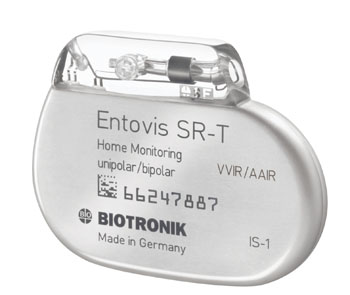Pacemaker System with MRI Scanning Capabilities Approved by FDA
By MedImaging International staff writers
Posted on 21 May 2014
A pacemaker system allows patients to undergo magnetic resonance imaging (MRI) scans with a limited exclusion zone. Posted on 21 May 2014
Biotronik (Berlin, Germany), a manufacturer of cardiovascular medical devices, reported that the US Food and Drug Administration (FDA) has granted approval for its Entovis pacemaker system with ProMRI technology. FDA approval encompasses both single chamber (SR-T) and dual-chamber (DR-T) Entovis pacemakers when implanted with Setrox pacing leads.

Image: The Entovis single-chamber pacemaker with ProMRI technology (Photo courtesy of Biotronik).
Around 50,000 single-chamber pacemakers are currently implanted in the United States each year; until now, these patients have not been able to access MRI scans. Biotronik is the first company in the United States to offer both single- and dual-chamber pacemakers approved for use in an MRI setting. Furthermore, Biotronik is the first company worldwide to offer the current generation of pacing leads with ProMRI pacemakers. Setrox, including versions released under other names, is the most used lead in MRI pacemakers on the market today with over 850,000 leads sold worldwide.
“With the Entovis longevity and the history of lead reliability, this is a system that will serve a wide variety of pacemaker patients for the foreseeable—and unforeseen—future needs,” said Carleton Nibley, MD, an electrophysiologist at John Muir Medical Center in Concord and Walnut Creek (CA, USA), and a participant in the ProMRI study.
The Entovis system offers advantages over existing pacemakers approved as MR-conditional. Patients with approved Entovis pacemakers and leads need only attentive radiology staff of their device and the staff will verify the patient meets the criteria to undergo an MRI scan.
FDA approval comes only 16 months after the first clinical study began, and 5 months after the approval of that study’s expansion to include full-body MRI scans. These studies are required by FDA for product evaluation, and are developed to assessment the safety and effectiveness of Biotronik’s existing single- and dual-chamber Entovis pacemaker systems and Setrox 53- and 60-cm leads during MRI scans. These devices are already commercially available in the United States but lacked FDA approval for use in the MRI environment.
“The Biotronik Biotronik Entovis ProMRI pacemaker system is the latest example of our commitment to excellence and meaningful innovation in supporting patient treatment and quality of life,” said Paul Woodstock, Biotronik executive vice president of sales and marketing. “We are proud to be able to satisfy the demand for state-of-the-art devices that allow physicians to deliver optimal care to the increasing number of pacemaker patients who may someday need an MRI.”
Entovis devices include Biotronik Home Monitoring technology, which provides daily monitoring of the patient’s device, and offer the most advanced physiologic therapy available using closed-loop stimulation (CLS). The Setrox active-fixation pacing leads have a flexible distal end, fractal coating, and steroid elution to ensure excellent handling and stable fixation, as well as optimal electrical performance.
Related Links:
Biotronik













.jpg)
